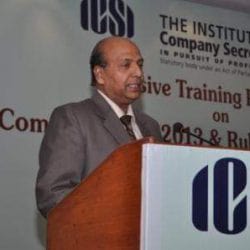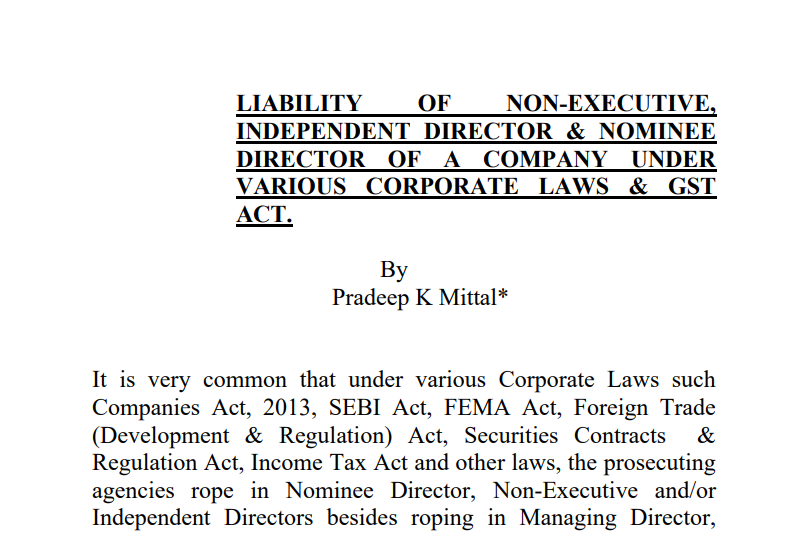LIABILITY OF NON-EXECUTIVE, INDEPENDENT DIRECTOR & NOMINEE DIRECTOR OF A COMPANY UNDER VARIOUS CORPORATE LAWS & GST ACT.
- LIABILITY OF NON-EXECUTIVE, INDEPENDENT DIRECTOR & NOMINEE DIRECTOR OF A COMPANY UNDER VARIOUS CORPORATE LAWS & GST ACT.
- COMPANIES ACT, 2013
- WHO ALL ARE LIABLE FOR OFFENCE:
- SEBI LAWS:
- NOMINEE DIRECTOR
- FOREIGN EXCHANGE MANAGEMENT ACT/FOREIGN EXCHANGE REGULATION ACT:
- UNDER INCOME TAX ACT, 1961.
- Download the copy:
LIABILITY OF NON-EXECUTIVE, INDEPENDENT DIRECTOR & NOMINEE DIRECTOR OF A COMPANY UNDER VARIOUS CORPORATE LAWS & GST ACT.
It is very common that under various Corporate Laws such Companies Act, 2013, SEBI Act, FEMA Act, Foreign Trade (Development & Regulation) Act, Securities Contracts & Regulation Act, Income Tax Act and other laws, the prosecuting agencies rope in Nominee Director, Non-Executive and/or Independent Directors besides roping in Managing Director, Whole-time Director Directors and other Directors who are in charge and responsible for the day to day affairs of the Company. Of late, in the last few years, the rigors of the law have loosened and the Hon’ble Supreme Court and various High Courts have appreciated the dilemma and predicament of Directors who are either Nominee Director, Non-Executive or Independent Directors of a company.
” Section 149 Companies Act, 2013: Company to Have Board of Directors
(1)to (11)……………………………………….
(12) Notwithstanding anything contained in this Act,-
(i) an independent director;
(ii) a non-executive director not being a promoter or key managerial personnel
shall be held liable, only in respect of such acts of omission or commission by a company which had occurred with his knowledge, attributable through Board processes, and with his consent or connivance or where he had not acted diligently.”
2: From the above, it is clear that (i) Independent Director; (ii) Nominee Director; and (iii) Non-Executive Director not being a promoter or key managerial personnel, shall be liable for any acts of omission and commission of company where the offense has been committed either with his knowledge or consent or permission which is attributable through a meeting of Board of Director – being attended by him in which such decision was taken which ultimately led to the commission of an offense.
3: At this stage, we may also note that the Ministry of Corporate Affairs also issued a Circular No.1/20 dated 2.3.2020 (MANU/DCAF/0033/2020), clarifying with respect to the following:-
In view of the express provisions of section 149(12), IDs and NEDs (non-promoter and in-KMP), should not be arrayed in any criminal or civil proceedings under the Act, unless the above-mentioned criteria are met. Typically, apart from IDs, non-promoter and non-KMP, NEDs, would exist in the following cases:
a) Directors nominated by the Government on the public sector undertakings;
b) Directors nominated by Public Sector Financial Institutions, Financial Institutions or Banks having participation in the equity of a company, or otherwise;
c) Directors appointed in pursuance to any statutory or regulatory requirement such as directors appointed by the NCLT.
4: The Ministry also clarified that Non-Executive Director would be arrayed as an accused in the criminal complaint only when there is no KMP and no WTD. It is also mandatory that prosecution is filed only after the approval of the Ministry. It is also stated in the Circular that with respect to pending prosecution if the above criterion has not been satisfied, it must be brought to the notice of the Ministry.
5. The Ministry also issued guidelines that at the time of serving notices to the company, during inquiry, inspection, investigation, or adjudication proceedings, necessary documents may be sought so as to ascertain the involvement of the concerned officers of the company. In case, lapses are attributable to the decisions taken by the Board or its Committees, all care must be taken to ensure that civil or criminal proceedings are not unnecessarily initiated against the IDs or the NEDs unless sufficient evidence exists to the contrary.
6: Therefore, in the event of receipt of Show Cause Notice from the office of ROC, the suitable reply could be given in the light of the guidelines issued in the above latest circular of MCA – giving the factual matrix of the case in hand along with the ratio laid down in the following cases of the Supreme Court and different High Courts – preferably with the photocopy of the judgments in a compilation form. It has been my experience that when a detailed reply, in the above manner, is submitted, ROC has not proceeded further in the matter. Needless to say that the Supreme Court in the case of J K Cements Ltd Vs. Commercial Tax Officer MANU/SC/1011/2016 has held that circulars issued by the authorities are binding upon them.
COMPANIES ACT, 2013
7: The Delhi High Court in the case of Har Sarup Bhasin vs. Origo Commodities India Private Limited: MANU/DE/0529/2020, the Delhi High Court has held as under:-
The petitioner is an Independent and a Non-Executive Director, in the absence of any specific role attributed against the petitioner for his active participation in the day to day affairs of the company and of taking all decisions of the company, where the petitioner was not a signatory to the cheques in question, vicarious liability cannot be fastened on the petitioner in the absence of any specific role attributed to him.
8: The Hon’ble Supreme Court in the case of Pepsi Foods Ltd. Vs State MANU/SC/1090/1998, has observed that the criminal law cannot be set in motion in a casual manner and further observed as follows:-
“28. Summoning an accused in a criminal case is a serious matter. Criminal law cannot be set into motion as a matter of course. It is not that the complainant has to bring only two witnesses to support his allegations in the complaint to have the criminal law set into motion. The order of the magistrate summoning the accused must reflect that he has applied his mind to the facts of the case and the law applicable thereto.
WHO ALL ARE LIABLE FOR OFFENCE:
9: To begin with, we may see landmark judgment of the Supreme Court in the case of K.K. Ahuja v. V.K. Vora MANU/SC/1111/2009, dealing with the vicarious liability of the officers of the company in a case of dishonor of cheque. The position under Section 141 of the Negotiable Instruments Act, 1881 can be summarized thus:
(i) If the accused is the Managing Director or a Joint Managing Director, it is not necessary to make an averment in the complaint that he is in charge of, and is responsible to the company, for the conduct of the business of the company. It is sufficient if an averment is made that the accused was the Managing Director or Joint Managing Director at the relevant time as by virtue of their office, they are in charge and responsible for the day to day affairs of the Company.
(ii) In the case of a director or an officer of the company who signed the cheque on behalf of the company, there is no need to make a specific averment that he was in charge of and was responsible to the company.
(iii) In the case of a Director, Secretary or Manager (as defined in Section 2(24) of the Companies Act, 1956) or a person referred to in Clauses (e) and (f) of Section 5 of Companies Act, an averment in the complaint that he was in charge of, and was responsible to the company, for the conduct of the business of the company is necessary to bring the case under Section 141(1).
(iv) Other officers of a company cannot be made liable under Sub-section (1) of Section 141. Other officers of a company can be made liable only under Sub-section (2) of Section 141, be averring in the complaint their position and duties in the company and their role in regard to the issue and dishonor of the cheque, disclosing consent, connivance or negligence.”
10: The provisions of Section 141 Negotiable Instrument Act is identically worded like that in all other Corporate Laws and other penal provisions under different legislations. Section 137 (1)(2) of the Goods & Service Tax Act, 2017 are also identically worded.
11: The issue relating to vicarious liability of a Non-executive Director came up for consideration before the Supreme Court in Pooja Ravinder Devidasani v. State MANU/SC/1177/2014 wherein it was held as under:-
“17… Non-executive Director is no doubt a custodian of the governance of the Company but does not involve themselves in the day-to-day affairs of the running of its business and only monitors the executive activity.
12: In Girdhari Lal Gupta Vs. D.H. Mehta MANU/SC/0487/1971, the Supreme Court observed that a person ‘in charge of a business’ means that the person should be in overall control of the day to day business of the Company.
SEBI LAWS:
13: In C.S. Raju v. SEBI MANU/SC/0598/2018, the Supreme Court held as follows:-
“23. Non-Executive Directors are, therefore, persons who are not involved in the day-to-day affairs of the running of the company and are not in charge of and not responsible for the conduct of the business of the company.”
NOMINEE DIRECTOR
14: In Ionic Metalliks case [MANU/GJ/0683/2014, Division Bench of the Gujarat High Court has made an endeavor to define the role of the different class of directors of a company, in the following words:-
The extent of a nominee Director’s rights and the scope of supervision by the shareholders is contained in the contract that enables such appointments, or (as appropriate) the relevant statutes applicable to such public financial institutions or banks. However, nominee Directors must be particularly careful not to act only in the interest of their nominators but must act in the best interest of the company and its shareholders as a whole… Whether nominee directors are required by law to discharge such duties or bear such liabilities will depend on the application of the legal provisions in question, the fiduciary duties involved and whether such nominee Director is to be regarded as being in control or in charge of the company and its activities. This determination ultimately turns on the specific facts and circumstances involved in each case.”
FOREIGN EXCHANGE MANAGEMENT ACT/FOREIGN EXCHANGE REGULATION ACT:
15: The Delhi High Court in the case of Ajay Bagaria Vs. UOI. MANU/DE/0818/2008 has observed as under:-
It is clear that a complaint under Section 68 FERA read with 18(2) thereof would have to contain some specific averment as regards each of the Directors before making them liable particularly where the filing of the complaint has been preceded by a notice to which a reply has been received from the Director concerned.
16: The Delhi High Court clearly holds that a Director could be made accused only when in the complaint, how and what manner, the Director is charge and responsible for the day to day affairs of the company, has been clearly spelled out – otherwise, the complaint is liable to be quashed at the very threshold by the High Court in a petition under Section 482 of Cr PC.
17: The Delhi High Court in the case of Parag Dalmia Vs Special Director of Enforcement, MANU/DE/3037/2012, has dealt with the aspect of initial burden of the Enforcement Directorate to prove that these persons were in charge and responsible for the day to day affairs of the company, which burden, has not been discharged by the Department and hence, on this count alone, the prosecution has been quashed against the petitioners. The Court made the following observations.
Thus, the contention of learned Additional Solicitor General that the opportunity notice is given to the Appellants clearly stated that they were in charge and responsible for the day-to-day functioning does not hold any ground. The initial burden is cast on the prosecution to prove that the concerned Director is responsible and in charge of the day-to-day functioning of the company whereafter the burden shifts to the accused to disprove the same.
10: “Nominee Directors: They can be appointed by certain shareholders, third parties through contracts, lending public financial institutions or banks, or by the Central Government in case of oppression or mismanagement.
CENTRAL EXCISE ACT;1944
18: The Rajasthan High Court in the case of Krishna Kumar Bagla vs. B.L. Sharma: MANU/RH/0667/1994, a prosecution case filed prosecution under Central Excise Act, 1944, while reiterating the above proposition of law, has observed as under:-
The bare reading of the above-said section makes it clear that it is only when the person sought to be prosecuted, was in charge of and was responsible to the company for the conduct of the business of the company that he can be punished if an offense is committed by the company, and the Directors, Manager, etc. can be punished only if the offense is committed with their consent or connivance, or is attributable to any neglect on their part. In the complaint, there are no allegations that the petitioner was in charge of the company or was responsible to the company for the conduct of its business or that the offense had been committed with his consent or connivance, or because of any neglect on his part.
UNDER INCOME TAX ACT, 1961.
19: The Delhi High Court in the case of ITO vs. Anil Batra: MANU/DE/2400/2014, on the liability of Directors for offenses committed under the Income Tax Act, 1961, has observed as under:-
In Madhumilan Syntex Limited (supra) it was held that the proceedings against the Directors would be maintainable as long as the complaint clearly stated that they were being treated as principal officers of the company. Even otherwise for the purpose of Section 278B of the IT Act, once the offense is shown to have been committed by the company, then the liability of the directors in charge of its affairs is attracted. The burden then shifts to such directors to show that the offense occurred without their knowledge or that they had exercised all due diligence to prevent the commission of such offense. The law as explained by the Supreme Court in Madhumilan Syntex Limited (supra) has not been noticed by the DJ&ASJ or the ACMM in the present case even while reference was made to the decision of this Court in Income Tax Officer v. Delhi Iron Works (P) Limited (supra).
20: The Madras High Court in a very recent case of K. Ramakrishnan vs. ITO Madurai MANU/TN/9801/2019 has observed as under-
16. This court has little hesitation to conclude that there is nothing in the complaint, that the petitioners, even as Nominee Directors, were in charge of the affairs of the company and consequently they cannot be made liable to face criminal prosecution.
21: Accordingly, the prosecution was quashed by the High Court on a petition under Section 482 of Cr PC.
22: In substance, over a period of last ten years, the Supreme Court and various High Courts have consistently held that Nominee Director, Independent Director or Non-Executive Director shall not be liable for the offense committed by the Company unless the offense has been with their knowledge or connivance or implied permission in a Board Meeting which was, inter-alia, attended by him. In case, prosecuting agency has wrongly roped in such Director, who belongs to any of this category or otherwise, who is not in charge and responsible for the day to day affairs of the Company, a petition could be filed before the High Court, having jurisdiction over the court of ACCM who issued a summons for him to appear, he can file a petition under Section 482 of Cr PC and seek quashing of the complaint filed by the prosecuting agency relying upon aforesaid judgments.
Download the copy:
If you already have a premium membership, Sign In.
 Advocate Pradeep Kumar
Advocate Pradeep Kumar
PK Mittal BCom Delhi university 1975 LLB Delhi University 1978 FCS Fellow Member of ICSI 1992 1982 to 1992 as CS in Corporate Head Legal Apollo Tyres Ltd 1986 to 1992 1993 onwards Advocate in Delhi High Court CESTAT NCLT = Practcising Indirect Tax and Corporate laws 1993 to till date. Written more than 100 Article on Company Law and Corporate laws Indirect Tax Speaker on Indirect Tax Co Law and IBC in various Seminars Workshop organised by ICAI ICSI and ICMA and other organisations Convenor Core Group on GST of ICSI













